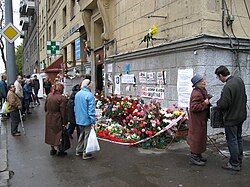Assassination of Anna Politkovskaya
On 7 October 2006, Russian journalist, writer and human rights activist Anna Politkovskaya was shot dead in the elevator of her apartment block in central Moscow.
[7] In December 2005, while attending a conference on freedom of the press organized by Reporters Without Borders in Vienna, Austria, Politkovskaya said: "People sometimes pay with their lives for saying aloud what they think.
"[8] She often received death threats as a result of her work,[9] including being threatened with rape and experiencing a mock execution after being arrested by the military in Chechnya.
[10] According to Russian state security officer Alexander Litvinenko, Politkovskaya asked him if her life was in imminent danger before the assassination.
According to Berezovsky, Putin uttered that Hakamada and her colleagues "will take in the head immediately, literally, not figuratively" if they "open the mouth" about the Russian apartment bombings.
Soon after her death, Vitaly Yaroshevsky, deputy editor of Novaya Gazeta, where she worked, said: "The first thing that comes to mind is that Anna was killed for her professional activities.
[21] On 8 October 2006, hundreds rallied in downtown Moscow to protest the murder of Politkovskaya and the recent crackdown on ethnic Georgians.
[22] The demonstration was described by the Moscow-based, liberal radio station Echo of Moscow as "the largest protest rally of the opposition recently held in Russia.
Further rallies and vigils took place in other Russian cities, including St. Petersburg, Yekaterinburg, Saratov and Krasnoyarsk, as well as London, Paris, New York, and Washington.
Historian Yuri Felshtinsky and political scientist Vladimir Pribylovsky commented that none of the official suspects had personal motives to kill Politkovskaya.
[54][55] On 3 April 2008, Investigating Committee of the Persecution Office of Russia Dmitry Dovgy[56] told the press that he is convinced that "Politkovskaya's murder was masterminded by Boris Berezovsky[57] and carried out by Khozh-Ahmed Noukhayev".
He said the organizers [of Politkovskaya's murder] "wanted to show that well-known people can be killed here in broad daylight, the law enforcement agencies seemingly unable to solve such crimes".
[59] On 1 July 2008, Russia's chief investigator Alexander Bastrykin confirmed that Rustam Makhmudov, the man believed by authorities to have fired the fatal shot, was hiding in western Europe.
The defence lawyer representing the four men charged over Politkovskaya's murder told reporters that the unnamed politician, based in Russia, was mentioned in the case files.
The deputy Editor-in-chief editor of Novaya Gazeta Sergei Sokolov publicly asserted in court that the suspected hitman Rustam Makhmudov had been wanted for other crimes by the police since 1998, but had been protected by the Russian domestic secret service (FSB) and, personally, by FSB Colonel Pavel Ryaguzov who provided him with a forged passport.
[65] Commenting on the end of the trial, Andrew McIntosh, Chairman of the Council of Europe Parliamentary Assembly's Sub-Committee on the Media and Rapporteur on media freedom, expressed his deep frustration at the lack of progress in investigating the murder of Anna Politkovskaya on 7 October 2006 and the inability of the Russian authorities to find her killers: "Two years ago, in its Resolution 1535 (2007), the Assembly called on the Russian Parliament to closely monitor the progress in the criminal investigations regarding the murder of Anna Politkovskaya and hold the authorities accountable for any failures to investigate or prosecute.
I call on the Russian authorities and Parliament to relaunch a proper investigation and shed light on this murder, which undermines not only freedom of expression in Russia, but also its democratic foundation based on the rule of law.
[68] In December 2012 former police officer Dmitry Pavliutchenkov was found guilty and sentenced to 11 years in prison for the murder in a special bargain deal for providing evidence against those who ordered the killing.
[70]: A8 On 14 November 2023, it was reported that Sergei Khadzhikurbanov, one of five people jailed for Politkovskaya's death, received a presidential pardon after accepting and finishing a contract to fight in Ukraine as part of Russia's invasion.

